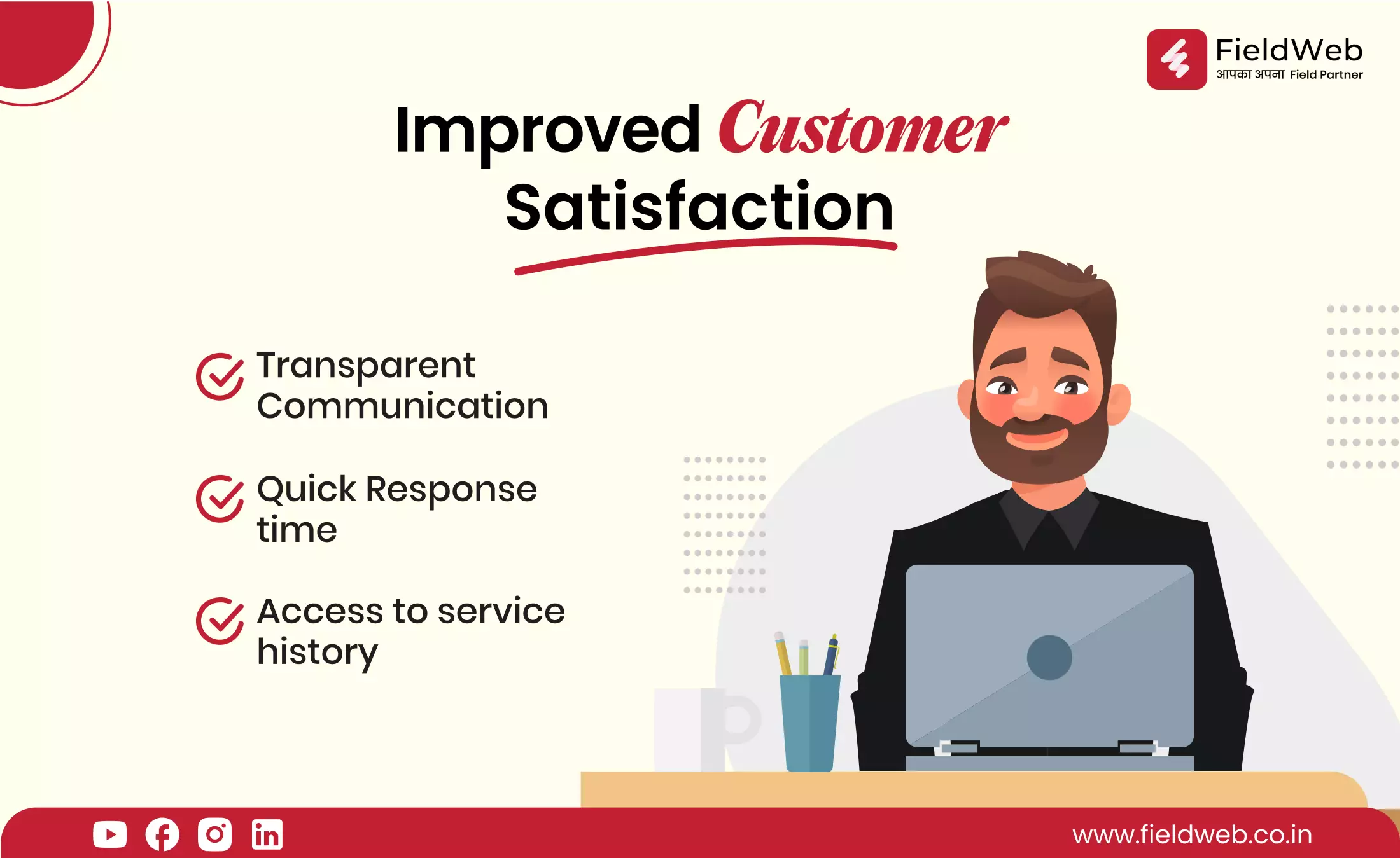
Top 5 Benefits of Implementing Field Service Management
Software for HVAC Businesses
Introduction:
Proper management of field service operations is crucial for HVAC
businesses to thrive in a competitive market. In today's digital age, Field Service
Management (FSM) software has emerged as a game changer for streamlining processes,
enhancing productivity,and improving customer satisfaction. In this blog, we will explore
the top five benefits of implementing FSM software specifically tailored for HVAC
businesses. Let's dive in and discover how this technology can revolutionize your HVAC
operations in the following pointers.
1. Enhanced Service Efficiency
- Automated Work Order Management: FSM software simplifies the creation,
assignment, and tracking of work orders. This eliminates manual paperwork and reduces
the chances of errors, ensuring a smooth flow of operations.
- Real-Time Technician Dispatching: With FSM software, dispatchers can efficiently
assign the right technician to the right job based on skills, availability, and
proximity. Real-time updates enable quick responses to customer requests, resulting in
improved service efficiency.
- Mobile Accessibility: Technicians equipped with mobile devices can access work
orders, customer information, equipment details, and service instructions on the go.
This eliminates the need for manual paperwork and allows technicians to complete tasks
more efficiently, resulting in higher productivity.
Example: For instance, when a customer requests an HVAC repair service,
the FSM software automatically generates a work order and assigns it to a technician who is
in close proximity. The technician receives a notification on their mobile device, which
includes all the necessary details. They can easily navigate to the customer's location,
access the equipment history, diagnose the issue, and complete the repair efficiently, all
with the help of FSM software.
2. Improved Customer Satisfaction
- Transparent Communication: FSM software enables better communication between HVAC
businesses and their customers. It provides real-time updates, appointment reminders,
and notifications about service progress. This transparency builds trust and enhances
the overall customer experience.
- Quick Response Times: With FSM software, HVAC businesses can promptly respond to
customer inquiries and service requests. The ability to schedule appointments
efficiently and dispatch technicians in a timely manner ensures that customers' HVAC
issues are addressed promptly.
- Access to Service History: FSM software maintains a comprehensive record of
customer service history, including past repairs, maintenance schedules, and equipment
details. This enables technicians to provide personalized service, resulting in higher
customer satisfaction.
Example: For instance, when a customer requests an HVAC repair service,
the FSM software automatically generates a work order and assigns it to a technician who is
in close proximity. The technician receives a notification on their mobile device, which
includes all the necessary details. They can easily navigate to the customer's location,
access the equipment history, diagnose the issue, and complete the repair efficiently, all
with the help of FSM software.
3. Streamlined Preventive Maintenance
- Automated Maintenance Scheduling: FSM software enables HVAC businesses to create
and manage preventive maintenance schedules for their clients. The software
automatically generates service reminders and notifications, ensuring that maintenance
tasks are performed at the appropriate intervals.
- Equipment Tracking and History: FSM software allows businesses to track and
monitor the performance of HVAC equipment. It provides insights into equipment usage,
maintenance history, and potential issues, enabling businesses to proactively address
maintenance needs and prevent costly breakdowns.
- Parts and Inventory Management: FSM software helps HVAC businesses keep track of
their inventory, ensuring that the right parts and supplies are readily available for
maintenance and repairs. This streamlines the process of ordering, restocking, and
managing inventory, reducing downtime and improving service efficiency
Example: For instance, when a customer requests an HVAC repair service,
the FSM software automatically generates a work order and assigns it to a technician who is
in close proximity. The technician receives a notification on their mobile device, which
includes all the necessary details. They can easily navigate to the customer's location,
access the equipment history, diagnose the issue, and complete the repair efficiently, all
with the help of FSM software.
4. Efficient Resource Allocation
- Optimal Technician Assignment: FSM software enables HVAC businesses to assign
technicians based on their skills, certifications, and proximity to the job site. This
ensures that the right technician with the appropriate expertise is dispatched for each
service request, improving efficiency and reducing travel time.
- Route Optimization: FSM software offers route optimization capabilities, allowing
businesses to plan efficient travel routes for technicians. By minimizing travel
distances and time, HVAC businesses can maximize their service capacity and complete
more jobs in a day.
- Workload Balancing: With FSM software, businesses can effectively distribute
workloads among technicians, ensuring that they are not overwhelmed or underutilized.
This balanced allocation of tasks improves productivity and customer service.
Example: Suppose an HVAC business receives multiple service requests in
a day. With FSM software, the business can analyze the requests, assign the most suitable
technicians based on their proximity and skills, and optimize their travel routes. This
results in efficient resource allocation, reduced travel time, and increased productivity,
allowing the business to serve more customers effectively.
5. Data-Driven Decision Making
- Performance Analytics: FSM software provides valuable insights and analytics on
key performance indicators (KPIs) such as response time, resolution time, customer
satisfaction, and technician productivity. These metrics help HVAC businesses identify
areas for improvement and make data-driven decisions to enhance their operations.
- Customer Feedback and Reviews: FSM software allows HVAC businesses to collect and
analyze customer feedback and reviews. This feedback provides valuable insights into
customer satisfaction levels, enabling businesses to address any concerns and
continuously improve their services.
- Business Growth and Expansion: With FSM software, HVAC businesses can track their
performance, analyze trends, and identify opportunities for growth and expansion. The
software provides a centralized platform to monitor business operations, assess
profitability, and make informed decisions for scaling the business.
Example: By analyzing the data and feedback collected through FSM
software, an HVAC business can identify patterns and trends in customer preferences, service
quality, and technician performance. This information can guide them in making strategic
decisions, such as implementing training programs for technicians, enhancing specific
service offerings, or expanding into new markets.
Conclusion
Implementing Field Service Management (FSM) software offers numerous
benefits to HVAC businesses in terms of enhanced service efficiency, improved customer
satisfaction, streamlined preventive maintenance, efficient resource allocation, and
data-driven decision making. By leveraging the power of FSM software, HVAC businesses can
streamline their operations, optimize service delivery, and stay ahead in a competitive
market. Embracing technology and implementing FSM software is a transformative step toward
success and growth in the HVAC industry.
Remember, choosing the right FSM software that aligns with your business
needs is crucial for maximizing these benefits. Evaluate your requirements, explore
different options, and invest in a reliable FSM solution that can take your HVAC business to
new heights of success.


